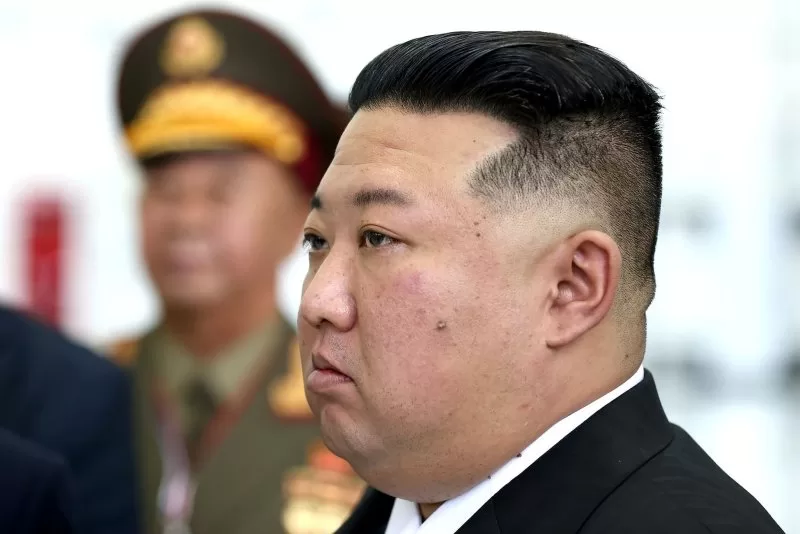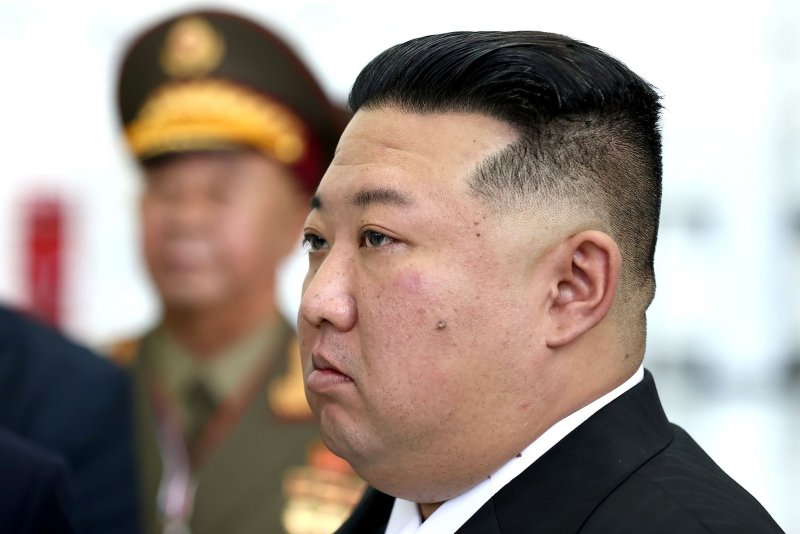North Korean Leader Kim Jong Un visited missile bases and called for or bolstering nuclear deterrence against the United States, state-run media reported Wednesday. North Korea has drawn closer to Russia and is accused of sending arms and troops to aid in Moscow’s invasion of Ukraine, potentially in exchange for nuclear and missile technology. File Photo by Kremlin Pool/UPI |
License PhotoSEOUL, Oct. 23 (UPI) — North Korean leader Kim Jong Un inspected strategic missile bases and called for bolstering nuclear deterrence against the “ever-increasing threat” posed by the United States, state-run media reported Wednesday.
Kim was accompanied on the visits by his sister, Kim Yo Jong, and high-ranking political official Kim Jong Sik, the official Korean Central News Agency reported. KCNA did not specify when the tours took place.
Images released by state media showed Kim standing next to massive Hwasong-18 intercontinental ballistic missiles, solid-fuel weapons with the range to reach the entire continental United States.
Kim “examined the readiness for action of strategic deterrence directly connected with the security of the country, including the important functions and capabilities of launch-related facilities in the missile bases and the strategic missile combat duty,” KCNA reported.
“As was stressed on several occasions recently, the U.S. strategic nuclear means pose ever-increasing threat to the security environment of the Democratic People’s Republic of Korea,” Kim said, using the official name of North Korea.
“The long-term threats urgently demand that the DPRK more definitely bolster its war deterrence and take a thorough and strict counteraction posture of the nuclear forces,” he added.
The United States and South Korea have increased their military cooperation in recent years with expanded drills and the deployment of U.S. assets such as aircraft carriers, a B-52 nuclear bomber and a nuclear ballistic missile submarine to the Korean Peninsula.
Kim’s tours come amid mounting international concern over North Korea’s close military relationship with Russia, including reports that Pyongyang has started sending troops to aid in Moscow’s war against Ukraine.
South Korea’s National Intelligence Service said last week that Pyongyang had decided to send some 12,000 troops, with 1,500 special forces troops already dispatched to Vladivostok in a Russian navy transport ship.
The NIS added that North Korea has provided more than 13,000 containers of artillery, missiles, anti-tank rockets and other deadly weapons to Russia on more than 70 occasions since August last year.
North Korea denied sending troops on Monday, calling the claims “groundless stereotyped rumors” during a session on disarmament and international security at the United Nations.
South Korean Ambassador to the U.N. Hwang Joon-kook raised concerns at a separate session that North Korea could be receiving missile and nuclear technology from Russia in exchange for dispatching troops.
“North Korea will expect a generous payoff from Moscow in return for its troop contribution,” Hwang said. “It could be either military or financial assistance; it could be nuclear weapons-related technology.”
A joint statement by South Korea and Britain also expressed alarm over the possibility of Russia aiding North Korea’s illicit weapons programs.
“We are closely monitoring what Russia provides to the DPRK in return for its provision of arms and military personnel, including Russia’s possible provision of materials and technology to the DPRK in support of Pyongyang’s military objectives,” the statement said. “We are also deeply concerned about the possibility for any transfer of nuclear or ballistic missile-related technology to the DPRK.”
Pyongyang has not conducted a nuclear test since 2017, but publicly showed off a weapons-grade enriched uranium facility for the first time last month as Kim called for an exponential increase in the North’s nuclear arsenal.

